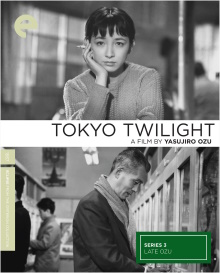I think this will be the last of the films of Yasujirō Ozu we’re going to watch. It’s as highly rated as the rest but is considered one of the director’s darkest films. Indeed if you’ve been frustrated by how the characters in Ozu’s films maintain their reserved demeanor and never break down despite their difficulties and stresses, this is the film for you. I don’t like this as much as the director’s other films. Perhaps this isn’t the most comfortable space for him to explore after all and even tries to end with a moralizing lesson. Still it’s a very strong film and it gives you a look at Ozu’s regular cast playing characters a little outside of their usual range.
Shukichi Sugiyama has two daughters after losing a son long ago and has raised them mostly by himself after his wife left him. The elder daughter Takako Numata is married and has a daughter of her own but has returned home to live with him after her marriage runs into problems. The focus however is on the younger daughter Akiko Sugiyama who is supposed to be a student but seems to have dropped out without telling her family. Instead she spends her time in a mahjong parlor and hanging out with her boyfriend Kenji. One night the owner of the parlor Kisako tries to talk to her, claiming that she used to be a neighbor. When she relates this incident to her elder sister, Takako realizes that the woman must be their real mother who left them when Akiko was still a baby. Shukichi blames their lack of a mother for his daughters’ problems. They don’t realize that Akiko has even more serious problems as Kenji has made her pregnant and is now actively trying to avoid her.
This is the classic story of a young woman putting too much trust in their boyfriend that we’ve seen many times before. The difference is that this is by Ozu so it’s not at all clear at first that things are so bad. Takako for example is evasive about what her problems with her husband are and Sukichi, played as always by Chishū Ryū, doesn’t press her too hard. It only gradually becomes clear that the film is going to dark places as Akiko is hiding secrets from her family and really is pregnant. This results in some notable scenes as Takako who goes to confront Kisako at the mahjong parlor or the two daughters having to explain to their father why Akiko was taken to the police station. The characters still have too much reserve to actually scream at one another but there are plenty of dramatic face offs that are loaded with regret and contempt. Ozu’s mastery at capturing human emotions is as evident as ever, making this film a delight to watch even if the elements of the plot are familiar ones.
Unfortunately, the moralistic tone in this film is off-putting as you can all but hear Ozu tut-tutting in the background. Akiko is hauled off to the police station simply for being a young woman hanging around a bar late at night. This seems excessive to modern eyes but it’s clear from the context that Ozu approves and has a dim view of young delinquents. Furthermore the larger theme is that the breakdown of the nuclear family is causing moral decay in society. It’s a difficult to get behind a theme like that and it’s unfair to ask that Takako to return to her husband for the sake of her daughter when the film refuses to give us any information of what went wrong in their marriage in the first place. It’s also very frustrating that Kenji essentially gets away scot-free and the consequences fall entirely on Akiko. Again, even if this accurately reflects the prevailing state of affairs of the period, it’s frustrating to watch. The whole thing smacks of boys will be boys and it’s up to good girls to know better than to get involved in them.
Ozu’s films are often praised for realistically depicting the universal human condition. This film demonstrates that what is or isn’t universal does depend on the values and mores of different cultures and periods. There’s some novelty value in watching Ozu explore darker subjects and as always he is a masterful director. But this is a tough film to recommend given how out of keeping with the times its themes and values are.
